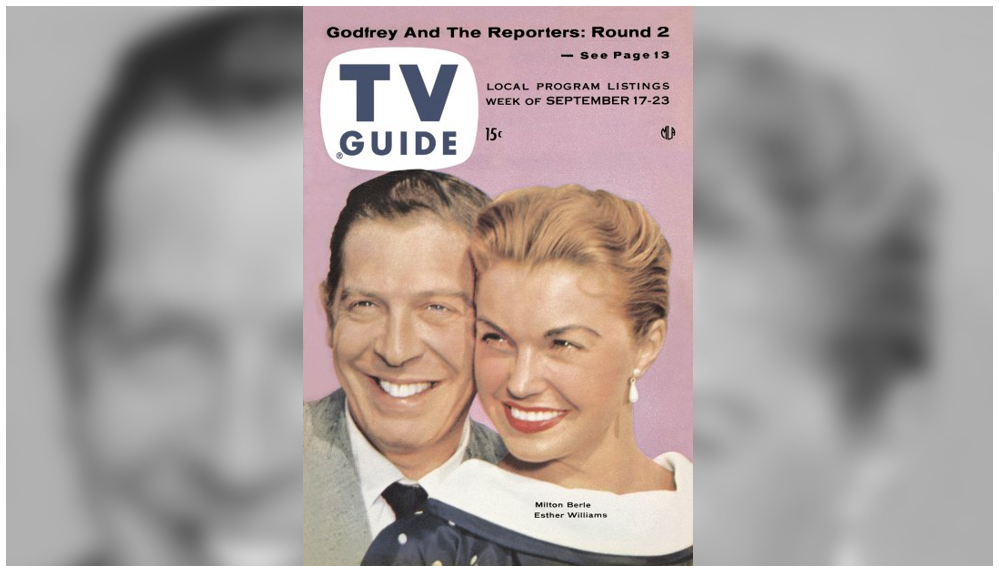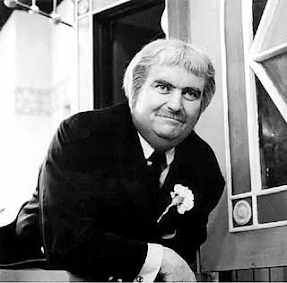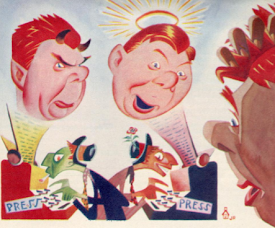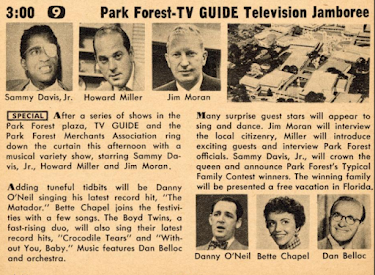Let's start the week off right with a look at two legends and their relationship to TV, beginning with Judy Garland and her television debut on next Saturday's 90-minute Ford Star Jubilee. It will be telecast live and in color (on the East Coast, anyway), with special guest David Wayne, playing the Fred Astaire role in a song from Easter Parade.
Garland is only 33 and without the gaunt look that we'd see a decade later—in fact, don't you think she looks like daughter Liza in the picture on that album cover below? And even though she cancelled the remainder of her national tour in order to do the special, she's nervous all the same. "I’ll probably come out on the stage, take one look at those three-eyed TV monsters and faint dead away," she says. "And then where am I going to find another medium to make my comeback?"
Still, it's a time of excitement, and she's not going to worry about it. "I’ll just work my head off, get good and sick 30 minutes before air time, and by Sunday morning we’ll know whether or not I’ve laid an egg." The writer is confident that she won't. And I don't think she did, either; included in the show is the only video performance of "Over the Rainbow" while wearing the famous tramp outfit that she so often wore in concert. As a matter of fact, you can see most of the show here and decide for yourself. As I frequently say, we're fortunate we have this much of our television history still intact.
l l l
From one legend to another: Frank Sinatra says he has no interest in doing television on a regular basis—it's "too tough," he says—but the networks keep coming after him, and he's not above doing the occasional special, such as this Monday's now-famous Producers' Showcase presentation of Thornton Wilder's "Our Town" (7:00 p.m. CT, NBC) in which Sinatra plays the Stage Manager and introduces the song "Love and Marriage."* The cast includes Paul Newman and Eva Marie Saint, the two teenagers at the heart of the story, plus Shelley Fabares and well-known character actors Paul Hartman, Ernest Truex, Sylvia Field, and Peg Hillias.
*It's also the first of a long collaboration between songwritesr Sammy Cahn and Jimmy Van Heusen.
But back to The Chairman; he's happy with "Our Town" ("a great script"), but he says he doesn't have any TV plans for the future. "I like movies better," he tells Dan Jenkins, although he makes fun of an early effort, 1948's The Miracle of the Bells, now popular on The Late, Late Show, in which he plays a priest, "walking through the role with all the grace and animation of a wooden Indian" according to Jenkins ("Pretty awful, wasn't it?" Sinatra acknowledges.) A man can afford to do that when he has an Academy Award on the mantlepiece, which Sinatra won five years later for From Here to Eternity. "Takes a guy that long to learn how to act," he says. "You gotta keep watching all the other guys and pretty soon you absorb enough of it or it just rubs off on you or something. Anyway, you learn." He learns pretty good; later in the year he'll star in The Man with the Golden Arm, for which he'll receive another Oscar nomination the following year. And despite his protestations to the contrary, he's got one more TV series up his sleeve, a 1957 effort for ABC that was to combine dramatic efforts with occasional music specials.
That series fails (as did an earlier CBS effort in 1950), but no matter; he remains a powerhouse in records and movies, and his frequent singing specials are always ratings hits. This must be our lucky week, though; "Our Town" is available on YouTube as well, and you can see it here.
l l l
Another week, another story about CBS's struggle to field a competitive morning show to go against Today. It seems as if this has been the case ever since television started, but that's an exaggeration; it's only been several decades. Anyway, we've already seen Walter Cronkite and Jack Paar try, and fail, to make a dent in NBC's dominance of the two-hour timeslot, but according to the New York TV Teletype, the network has a radical new idea: "Bill Leonard, local New York CBS commentator, will do feature stories; Charles Collingwood will continue with the news, and Bob Keeshan, original 'Clarabell' on Howdy Doody, will do a kid show, Captain Kangaroo."
Now, isn't that something? CBS does, in fact, cut The Morning Show down to an hour, and giving the second hour to The Captain. Paar actually stays with the show until the following year, when CBS moves him to a late-morning program of his own. Paar's replaced by Will Rogers, Jr.; that format lasts 14 months before Rogers is replaced in turn by country singer Jimmy Dean; that show runs for 45 minutes, with a 15-minute morning news program leading into Captain Kangaroo; the whole shebang lasts another nine months, after which CBS gives up altogether until The CBS Morning News debuts in 1963.
Meanwhile, Captain Kangaroo continues weekdays until 1982, when it's moved to the weekend in order to make room for an expanded CBS Morning News, hosted by Bill Kurtis and Diane Sawyer, which actually worked for while—before failing again.
l l l
Let's stay with the industry news for a bit longer. Dan Jenkins takes a not-so-fond look back at the summer season just ended; "If 'good riddance' is too strong a term, and it probably is, let it be said that it was a 'normal' summer. As such, it in no way measured up to the exciting promises voiced by the networks." Only one program, The $64,000 Question, emerged from the season to become a hit, and while Jenkins questions its cultural value, rest assured that it's going to become a symbol of television culture—cough, scandal—before long.
Johnny Carson debuted his variety program on CBS*; the "bright young comic" is still in the launching stage, but when he takes off, it'll be quite a flight. Julius La Rosa, standing in for Perry Como, was "pleasant, if not inspiring." His old boss, Arthur Godfrey, turned the reins over to Frankie Laine, "who poses no immediate threat." Many of the "spectaculars" promised for the summer were less than special, including "One Touch of Venus," which I mentioned just a few weeks ago. Jenkins wastes fewer words than I did in describing it; it was "a bore."
*You can find this on DVD, and while I think the makers would like you to mistake this for The Tonight Show, it's worth it anyway, to see his legendary career in its embryonic stage.
I don't want to give the impression that everything was bad, though. Jenkins liked Ethel and Albert, the Peg Lynch-created crossover from radio, writing that it was "one of the few intelligently written husband-and-wife situation comedies extant and should be jealously preserved for the benefit of the American sanity." He also liked The Dunninger Show, starring the famed mentalist (you can read about the TV Guide profile here), calling him a pheonmenon, and adding that "there aren't many phenomenons on TV." Then or now, if you ask me. And the anthologies that continued throughout the summer, such as Studio One, were satisfying.
All in all, says Jenkins, good television "is somewhat akin to the weather. Everybody talks about it, nobody does anything about it—yet occasionally, as though all by itself, along comes that rare day in June. It’s the waiting that can kill you."
l l l
John Cameron Swayze, anchor of NBC's Camel News Caravan, is the latest to weigh in on the effect television has on children, and surprise: he believes they'll profit from it.
While acknowledging that "a few programs are not what they should be," Swayze points out that "our youngsters' TV experiences are in no way limited to specifically designed 'children's programs,' either good or bad; their interest isn't limited to programs tailor-made for their particular age group." Because of its visual impact and sense of immediacy, "televisison has captured the child's imagination and boosted interst in areas of thought and activity often considered outside his own sphere."
In support of his contention, Swayze points to his own experience with News Caravan; more than 35 percent of the mail he gets is from children between six and 16, a "tremendous response" from a demographic that's not the target market. In one week, he received letters from an entire New Jersey elementary class commenting on world problems; had a letter from a 14-year-old in Arkansas asking about use of the H-bomb for defense; heard from a 15-year-old with her views on the power struggle in the Kremlin; and had a 10-year-old write asking for ideas on the president's foreign policy." Many colleagues, he reports, have received similar kinds of mail from young viewers; among other things, he concludes, "we parents are slow to realize how much youngsters are interested in what’s going on in the world beyond their own particular family and school realm."
The lesson, he says, is that parents should "take advantage of this painless, entertaining 'schoolroom,' i.e., the TV set," and understand that children "are quite capable of interest in good adult programming." It's not enough to make sure they see they monitor children's programs; "a little effort should be put to surveying personally the type and quality of the many TV programs available and scanning daily schedules for shows overlooked that could spark their child’s interest." It might surprise them, as it surprised Swayze, to find out "they have been selling young folks a bit short when it comes to enjoying and profiting from the better type of so-called grown-up TV fare."
l l l
We'll wrap things up for the week with a look at more programming highlights, beginning with the debut of Perry Como's one-hour primetime show (Saturday, 7:00 p.m., NBC). Perry's guests are an all-star lineup including Frankie Laine, Rosemary Clooney, Marion Lorne, Leo DeLyon, and Dave Barry. Como had hosted the three-times-weekly Chesterfield Supper Club since 1948, and his hour-long show is an instant hit, becoming the Kraft Music Hall in 1959, and remaining on the air until 1963, when Como decides to cut back to several specials per year.
On Sunday, it's the premiere of Famous Film Festival (6:30 p.m., ABC), notable for being the first primetime movie series on network television, featuring nearly three dozen recent movies from Britain. Tonight's premiere is Carol Reed's grim 1947 thriller Odd Man Out, starring James Mason in one of his greatest performances, supported by Robert Newton and Kathleen Ryan. If you're looking for something a little more lighthearted, Dean Martin and Jerry Lewis are back to kick off the new season of the Colgate Variety Hour. (7:00 p.m., NBC) Included in tonight's features a satire on the recent differences of opinion between the two stars; Less than a year later, the partnership is dissolved. I wonder if the "differences" referred to here are what precipitated the break, or if it's something else. They're going up against Ed Sullivan's Toast of the Town (7:00 p.m., CBS), tonight spotlighting the U.S. Navy's World Wide Talent Contest, with the finalists coming from all over the world. Julius La Rosa and the Marquis Chimps are also part of the fun.
Besides "Our Town," Monday also features opera star Roberta Peters on Voice of Firestone (7:30 p.m., ABC), where in addition to the classics, she sings pieces by Noel Coward and Richard Rodgers. And later, on WTMJ in Milwaukee, Orson Welles' brings film noir to Shakespeare in his 1948 black-and-white adaptation of Macbeth, with Jeanette Nolan in her film debut as the murderous Lady Macbeth. (Midnight)
A pair of premieres are on tap for Tuesday, starting with Cheyenne (6:30 p.m., ABC), one of the three rotating elements of Warner Brothers Presents, and the only one to survive to a second season. Cheyenne is not only the first hour-long Western, it's the first hour-long show with continuing characters to survive beyond one season. Meantime, at 7:30 p.m. on CBS it's the inaugural episode of You'll Never Get Rich, later to be known as The Phil Silvers Show, starring Silvers in his most famous role as Master Sergeant Ernie Bilko.
Wednesday, Arthur Godfrey and Friends begins the night for CBS (7:00 p.m.), which leads us to one of the week's cover stories, part two of Godfrey's feud with the press. The star himself shrugs off any significance to what's written about him; "I learned a long time ago to read as little as possible about myself," he told one interviewer. "First they build you up; then they tear you down." And such is the case with Godfrey; for years he enjoyed laudatory writeups from the press, but the tide began to turn with the firing of Julius La Rosa, when his role suddenly switched "from hero to villain, from crusader to bully." Says Ben Gross of the New York Daily News, "to see the Great Man requires the eating of more humble pie than trying to interview the Queen of England. He is the master of the brush-off, with a generally contemptuous manner toward newspapermen." Godfrey's vow to even the score in his upcoming autobiography doesn't help things any, and despite his best efforts he never regains the popularity he once enjoyed.
Thursday belongs to guest stars, with Nina Foch and Vincent Price starring on Climax! (7:30 p.m., CBS); naturally, Price is the heavy, and meets an untimely ending. Ida Lupino, one of the four stars of Four Star Playhouse, stars in "With All My Heart" (8:30 p.m., CBS), while Brian Donlevy and Bobby Van are the leads in "The Policy of Joe Aladdin" on Ford Theatre (8:30 p.m., NBC) And WTMJ's midnight movie is The Lie, with Lee Bowman as a man who wakes up to find a dead body in his room. How many times has this happened to you?
Throughout the week, the merchants of the modern Park Forest Plaza in Park Forest, Illinois ("60 modern stories! Parking for 3500 cars!") have been celebrating the "Park Forest-TV Guide Jamboree," and Friday features a musical-variety hour with local celebrities, headlined by a non-local celebrity: Sammy Davis Jr., who also crowns the queen of the festival. (3:00 p.m., WGN) In case you were curious, the Park Forest Plaza is no more, but it's not a victim of the recent downturn in retail malls; it came to an end in 1996. Later, on Edward R. Murrow's Person to Person (9:30 p.m., CBS), it's a great doubleheader: first Ed interviews conductor and composer Leonard Bernstein and his wife, Felicia Montealegre; then his guest is Olympic legend Jesse Owens. Not a bad way to end the week, right? TV












Paul Newman and Eva Marie Saint would star in the film adaptation of "Exodus" released in 1960.
ReplyDelete